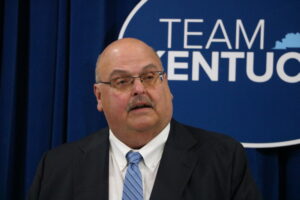‘Defining moment’: East Kentucky Power expanding solar with up to $1.4 billion from feds
October 28, 2024
FRANKFORT — A federal investment of up to $1.4 billion to expand renewable energy will help transform how a Kentucky utility serves future generations of Kentuckians, its CEO said Monday.
Officials from East Kentucky Power Cooperative (EKPC) and the U.S. Department of Agriculture joined Gov. Andy Beshear at the state Capitol Monday morning to tout funding that will build solar installations producing 757 megawatts of electricity and improve transmission infrastructure.

EKPC President and CEO Tony Campbell said the funding, which could consist of grants or subsidized loans, was a “defining moment” for the nonprofit utility that generates electricity for 16 power distribution cooperatives across the state. The USDA announced the funding last month.
“We will reduce greenhouse gas emissions and operate with less carbon intensity, while maintaining reliability service and competitive rates,” Campbell said. “East Kentucky Power Cooperative is doing our part to help address global greenhouse gas emissions and slow the impact of climate change. We are boldly planning for Kentucky’s energy future.”
The funding comes from the Empowering Rural America program (New ERA), monies made available through the passage of the Inflation Reduction Act opposed by all of the Republicans in Kentucky’s congressional delegation.
Administrator of the USDA’s Rural Utilities Service Andy Burke also said EKPC will receive additional funding in the form of tax credits on top of the $1.4 billion from the New ERA program.
The USDA received 157 proposals for clean energy projects, and so far the federal department has awarded funding for nearly two dozen of those proposals including to EKPC.
Beshear called the announcement one of the biggest investments in the state’s electric infrastructure since the New Deal, saying the funding would help with economic development for companies that want renewable energy.
“Just about every company asks what energy portfolio we can bring to them. It’s either commitments to sustainability they’ve made,or they’ve been demanded by their downstream customers,” Beshear said. “The answer has always been, ‘We’ll get there, and we’re working on it.’ We’ve got a very big answer today with about $1.4 billion.”
Campbell told reporters EKPC intends to build solar installations itself instead of purchasing solar power from private solar developers, known as power purchase agreements. He said the solar installations have to be “on the ground” by Sept. 30, 2031 to comply with a federal deadline.
Roughly 40 transmission projects are also being planned, he said, for “both reliability and to allow more renewables to flow” to homes and businesses. Earlier this year, EKPC proposed to build two solar installations in Fayette and Marion counties generating a combined 136 megawatts of electricity.
Like other electric utilities in Kentucky, EKPC generates the majority of its power from burning coal, the biggest emitter of greenhouse gasses contributing to climate change among electricity sources. Environmental advocates have previously lauded New ERA funding but argue more needs to be done to move utilities from fossil fuels to clean energy sources.
EKPC is supporting a lawsuit to federal regulations that would require utilities to curb nearly all greenhouse gas emissions by 2032 from new natural gas-fired power plants and existing coal-fired power plants. Campbell said the New ERA funding would help the utility “go down the path to start decarbonizing our generation portfolio” while not harming the reliability of the power supply.
The leader of the United Nations last year called for developed nations to have carbon-free electricity generation by 2035 and a phase out of coal-fired power by 2030 in order to avoid the worst harms from climate change. A United Nations report last week found the world was on track for catastrophic warming by the end of the century because of the unabated burning of fossil fuels.
When asked about the call for action from the United Nations’ leader, Campbell said renewable energy paired with battery storage systems hadn’t “evolved enough” to “totally run the country on that.”
“We have to have reliable power plus decarbonize,” Campbell said.
Other utilities across the country are investing significantly in solar installations and battery storage systems, and the International Energy Agency considers solar and wind power to be the cheapest form of electricity in most of the world.
Burke, the USDA official, said the decreasing cost of renewables and battery storage systems is “going to build that clean energy future we need.”
“But we need to do it in a reliable way that makes sense to the person who still has to pay that utility bill at the end of every month,” Burke said.
YOU MAKE OUR WORK POSSIBLE.
Search
RECENT PRESS RELEASES
Related Post




